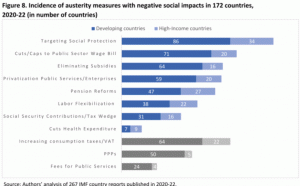There has been some interest recently in wealth inequalities, for example in work by the Fairness Foundation. Much of this focuses on the wealth of the very rich. In recent correspondence, I’ve been struck by the extent to which others considering the issue have focused, not so much on the implications of inequalities in wealth, but on fair taxation and inequalities of income – problems relating to benefits and low wages. I’m sceptical that either focus can address wealth inequalities in a meaningful way.
Any conceivable redistribution of income will not (by definition) touch the established holdings of people who hold assets as wealth – typically in the form of real property or financial products. There may have been an argument in the 1950s and 60s for heavy taxation of income (the flow) to prevent the accumulation of wealth (the stock), but the genie is out of the bottle; the wealth has been already been accumulated. Income taxation now can slow further accumulation, but that does not begin to address the issue.
That may seem to some to constitute an argument for wealth taxes, such as property taxes, inheritance tax or taxes on capital transfer. That makes sense in terms of fairness – subjecting wealthy to the same criteria as others – but it can only ever have a limited effect on the distribution of assets, because they are based on a proportion of wealth at best.
What we need to do, instead, is to reconsider how the problems created by unequal wealth might be addressed. Wealth inequalities may have seemed harmless to Tony Blair, who said he was “intensely relaxed about people getting filthy rich”, but they have implications for people who don’t share in that wealth. In particular, they create obstacles to access to land, housing and, to the extent that people have become rich by using their assets to extract money from people who aren’t rich, they make for problems relating to rent, poverty and debt.
I think there are two main directions to go in. The first is to consider the problems, not of the rich few, but of the many poor – in these terms, those who do not have assets. More income will help deal with issues of poverty, debt and manutrition; and regulations to cover those circumstances, such as protection related to financial services or limiting the interest that any creditor can receive, would have direct benefits. However, in important fields of life – especially rent and residential care – the main beneficiaries of greater income support will be those who hold the assets on which those services are based. Supporting income is not enough.
The second direction is to establish a base of assets that will be available to people regardless of their financial circumstances.When the National Health Service was introduced, it had a major effect on the resources available to the poor – an effect that is largely concealed by the way we choose to keep public accounts. Part of this can be seen as an implicit income: everyone in Britain has, whether they use the service or not, a financial gain equivalent to the value of health insurance. Part, however, is the equivalent of a savings fund: the protection of assets that in other circumstances would be exhausted. When people have access to social housing, libraries, museums and parks they have gained command over resources – if not quite as good as ownership, something pretty close. And when those resources are withdrawn from people, they feel the loss.
A wide range of basic services could be treated in this way. They include, for example, funeral plots, free transport, legal aid, university education, wi-fi, child care, basic banking services and mailboxes. Provided publicly, these things allow people to act as if they had the assets themselves. That would have a much great effect than any focus on the assets of billionaires.
